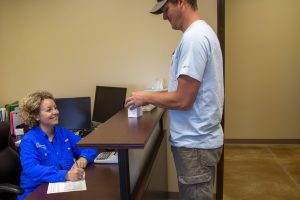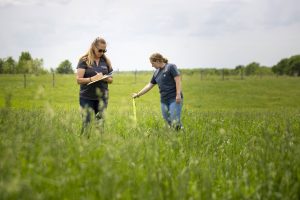MU Extension Field Specialist Valerie Tate sat at her desk near Linneus as her co-worker popped in.
“Oh, hey, do you mind if I put these insect traps up around the farm as part of the statewide MU IPM pest monitoring network?” Tate asked.
When she asked this question, Tate was already on “the farm.” Tate works out of the Linn County Extension Office, which moved into the administrative building at Cornett Farm — part of Mizzou’s Northern Missouri Research, Extension and Education Center (NM-REEC) — in March. The REEC is part of the College of Agriculture, Food and Natural Resources’ Missouri Agricultural Experiment Station.
Tate and NM-REEC Director Jeff Case both say the move has already proved a valuable strengthening of the partnership between the REEC and Extension offices.
“It’s been an immediate return,” Case said. “Just in terms of the numbers of farmers and producers and even parents of youth who have been out to the farm to just drop off paperwork for 4-H, they are all getting exposure to the REEC.”

The move has provided a number of benefits for the entities. In addition to bringing more awareness to the research facilities, which allows the REEC to reach more people and producers, it provides Extension personnel like Tate with event space and opportunities for more hands-on learning.
Since the move, the facility has already hosted Farm Safety Day, an event focused on area youth who, even if their family are not farmers, are often exposed to agriculture. Other events MU Extension has planned at the REEC for this year include a Regional Grazing School, Linn County Extension Council meetings, and 4-H project meetings.
“In Extension, we always say we are the front door of the university,” Tate said. “It’s our job to take the research done at the university and deliver it to the citizens of the state. This move has given me the opportunity to see that research first-hand and be involved in the research and be more credible when I deliver it.”
Prior to the move, Tate would have had to drive from the office in town about 10 miles to the research facility to hang those insect traps. Now, she simply walks out the door. Later that same day, she was able to walk from her office to measure cool-season grasses that she is helping research.

Tate says that Case was instrumental in making the move happen, although discussions had been in the works for some time.
“It’s a natural fit in my opinion,” Case said, “And the doors are open to all of the Extension offices in the Northern Missouri REEC. We are all the University of Missouri.”
The Northern Missouri Research, Extension and Education Center (NM-REEC) is composed of three properties, each focused on research and educational needs of the local community.
Cornett Farm was established in 1965 when the University began leasing land from the Cornett family. The 1,200-acre farm was donated in 1981 upon the death of the last Cornett family member.
The primary research objective is the development and evaluation of forage/beef systems for all classes of beef cattle.